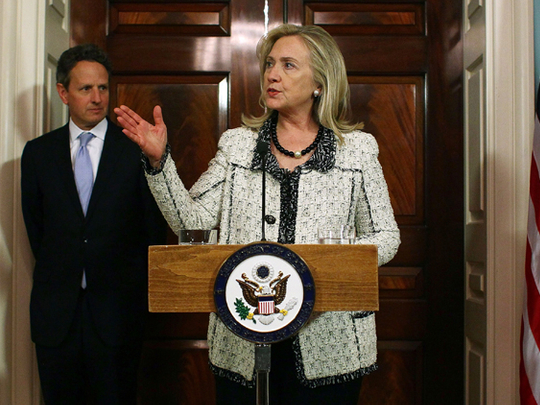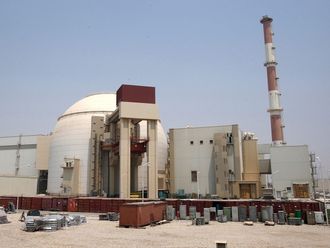
Brussels: The European Union is eyeing sanctions on some 200 Iranian firms and individuals as Western nations tighten the screws on Tehran over its contested nuclear programme, diplomatic sources said Tuesday.
The new measures would be announced by EU foreign ministers meeting in Brussels on December 1, the sources said.
"More than 200 extra names are to be added to the list" of sanctions against Iran, said one EU diplomat who asked not to be identified.
Another diplomat said EU nations were debating whether to also target "new areas and industry sectors" but that no decision had been taken as yet.
EU 'not divided' over sanctions
Asked if EU nations were split over such economic sanctions, the source said: "They're not divided over sanctions on entities and individuals."
The discussions take place as the United States, Britain and Canada this week splapped new sanctions on Iran because of a report by the UN atomic energy watchdog strongly suggesting Tehran was researching nuclear weapons.
Iran and ally Russia blasted the measures against the nation's financial, petrochemical and energy sectors. Tehran dubbed them "propaganda and psychological warfare," while Moscow said they were "unacceptable and against international law".
The United States and its allies cited a November 8 report by the UN's International Atomic Energy Agency asserting "credible" evidence of Iranian research programmes for nuclear weapons as justification for their new sanctions.
New sanctions 'reprehensible'
Tehran: Iran on Tuesday blasted new sanctions against it announced by the United States, Britain and Canada as "reprehensible and ineffective".
Foreign ministry spokesman Ramin Mehmanparast made the comments a day after Washington, London and Ottawa said they were levelling additional sanctions on Iran's financial sector because of a report by the UN atomic energy watchdog strongly suggesting Tehran was researching nuclear weapons.
Iran threatens to review nuclear watchdog co-operation
Earlier it was reported that Iranian lawmakers were Tuesday to review cooperation with the UN atomic energy watchdog, the day after the United States and allies slapped new sanctions on Tehran over its nuclear programme.
The meeting of parliament's national security and foreign policy commission was to follow a regular weekly briefing of foreign ministry spokesman Ramin Mehmanparast expected to address the fresh sanctions.
The United States, Britain and Canada on Monday announced they were taking moves to further isolate Iran's central bank and other financial institutions in order to add pressure on Tehran on its atomic activities.
'New unprecedented sanctions'
France said it, too, was "in favour of new unprecedented sanctions."
The coordinated, unilateral sanctions were being imposed on the basis of a November report by the UN's International Atomic Energy Agency that said there was "credible" evidence Iran appeared to be pursuing nuclear weapons research.
Iran has slammed the report as "baseless" and accused IAEA chief Yukiya Amano of pro-US bias. It has reiterated that its nuclear programme is exclusively for peaceful, civilian uses.
Tuesday nuclear forum boycotted
While some Iranian lawmakers have called for cooperation with the IAEA to be cut, and Iran boycotted an IAEA forum Tuesday focused on creating a nuclear weapons-free Middle East, officials have said Iran would maintain its obligations under the agency.
Foreign Minister Ali Akbar Salehi said on Sunday his country would even cooperate "further" with the UN atomic energy agency if it "balances its approach" to the Islamic republic.
Trade and commerce minister, Mehdi Gazanfari, admitted Monday ahead of the new sanctions - which had been signalled days ahead in the US press - that Iran would "suffer" under the measures.
But he asserted that Iran would survive by becoming more self-reliant, and by doing business with other countries.
Gazanfari also said countries shying away from Iran because of the sanctions would be hurt by losing access to Iran's oil and gas exports.
Energy supply threat
"It is they (who face) not having enough energy (supplies). Because if they do not come here and invest, then they should think of alternatives," he said.
"If they do not invest in our oil projects, they will lose a good market for contracts as well as the market for installing equipment. Companies making this equipment would be shut down," he said.
Iran's economy, worth an estimated $480 billion according to the International Monetary Fund, is highly dependent on oil sales, which make up around 70 per cent of government revenues.
Noose tightened
The sanctions announced Monday aim to tighten the noose on Iran's financial sector, making it more difficult for the country to be paid for its oil.
They stopped short, however, of hitting the central bank with more draconian measures, which Western officials and analysts feared could cause a spike in oil prices, worsening the global economic malaise and providing Iran with a revenue windfall.












